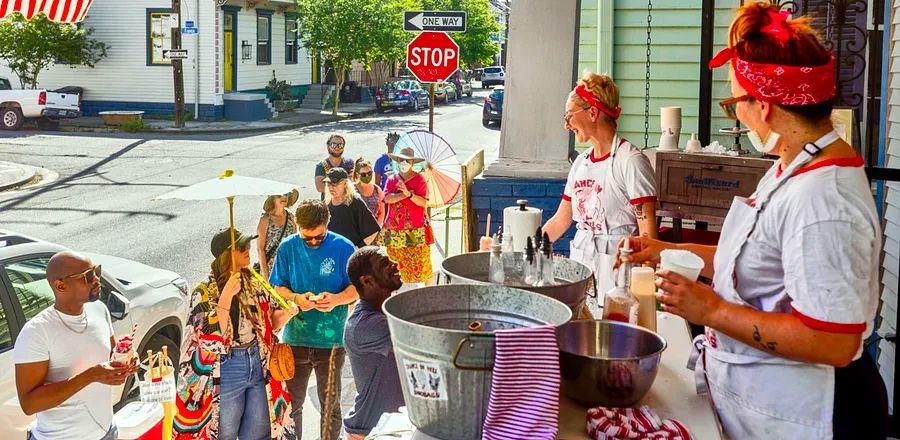Hidden Snowballs? Exploring the “Alternative Universe” of New Orleans Pop-Ups

There’s a humorous saying around here: If you can’t thrive in New Orleans, don’t leave. While it may not hold true entirely, especially with the increasing cost of living, there are countless reasons why living in this warm, weathered city is delightful. One of the key factors is the local perspective on work; here, people focus on working to live, not the other way around.
Naturally, this mindset brings its own set of challenges—quirky business hours and the chaotic whirlwind of Mardi Gras and festival season—but it also provides a counterbalance to the modern American expectation of surrendering one’s life to emails, Slack, Zoom, and other aspects of contemporary life. Thus, New Orleans, with its unique geographical and philosophical landscape, has become a rich ground for a lively ecosystem of underground businesses known as pop-ups, which emerge in various locations and are often temporary.

Photos by L. Kasimu Harris
New Orleans has long embraced informal food events: crawfish boils on street corners, barbecue and beer vendors at second line parades, and Lenten fish fries at local churches. However, the pandemic brought about a transformative shift. In the early days, with restaurants closed and hospitality workers finding themselves with unexpected free time, it became increasingly common to see food being sold from front porches or at bars supporting grassroots ventures.
These days, scrolling through a hyper-local Instagram feed unveils a vibrant array of non-establishments flourishing in the ambiguous bureaucratic landscape that gives the city much of its unique charm and frustrating complexity. (Obtaining permits can be prohibitively expensive and confusing for pop-ups, prompting many informal businesses to set up in whatever way makes sense. So far, the repercussions have been minimal, despite warnings of a city crackdown.) Some are easier to discover, while others remain elusive—this, too, adds to the city’s allure.
One day, you might stumble upon the Filipino pop-up Gatâ serving sinigang soup and chicken inasal at Miel, a brewery in the Irish Channel. The next day, Tacos Para La Vida may be whipping up birria pizza and tostadas at Pal’s Lounge in Bayou St. John. (Both Miel and Pal’s host pop-ups almost daily.) On Tuesdays at the Southern Food and Beverage Museum, Bronwen Wyatt of Bayou Saint Cake might be layering chiffon, homemade preserves, and buttercream frosting. A few times a month, Harlem native Serigne Mbaye holds his renowned pop-up Dakar at various restaurants across the city, declaring, “My business is wherever I am.”
Browsing a hyper-local Instagram feed unveils a realm of non-establishments thriving in the bureaucratic gray areas that contribute to the city's charm and complexity.
Pop-ups extend beyond food as well. There’s Waysides, a quirky flower shop operating from a mobile truck; Finch Hatton, an antiques vendor; and Lekha, which offers handmade clothing from India. (All three once shared a location; now Finch Hatton and Lekha are in search of more permanent spaces.) On Sundays at Bar Marilou, sommelier Uznea Bauer hosts the Tell Me Bar, a natural wine pop-up. Tiny Nest Botanicals, a plant service run by Abby Barber, occasionally appears around town with her 1976 VW camper van, selling vibrant banana leaves and colorful succulents. Cubs the Poet—the poet-in-residence at the Columns hotel—travels the city with his typewriter, setting up at weddings or markets to create on-the-spot poems.

Photo by L. Kasimu Harris
This alternate reality—a realm apart from Yelp, Tripadvisor, and tour buses—exists quietly beneath the surface. Some pop-ups have been around long enough to become permanent, licensed venues; others blaze brightly before quickly fading away. That’s why, when you encounter them, it’s crucial to appreciate their fleeting nature and seize the opportunity. The most delicious ice pop (or the best yakamein, or the loveliest bouquet) might emerge from a pop-up that will soon vanish back into the city’s mysterious depths.
Last year, Tony and I seized the chance to set up our wine shop, Patron Saint, in a Lower Garden District restaurant space that had been dormant since the pandemic. Within a few months of the restaurant’s closure, I, along with chef Ana Castro, restaurant owner Michael Stoltzfus, and the creators of Lucy Boone Ice Cream, established Here Today, a collective storefront. I purchased a couple of utility shelves from Walmart, filled them with over 800 bottles, and awaited our guests.
Every weekend for three months, that corner buzzed with energy. Word had spread that something exciting was happening on this otherwise quiet block. As the afternoon turned to evening, the area transformed into an impromptu street celebration. People gathered on the curb, enjoying glasses of Slovenian pét-nat (naturally sparkling wine), making new friends, savoring fried chicken sandwiches and sweet potatoes with mole encacahuatado, reveling in the unique magic that only a pop-up can create.
Since then, that corner space has transformed into Lengua Madre, Ana Castro’s contemporary tribute to the Mexican cuisine of her youth, while Tony and I are establishing a permanent wine shop just a few blocks away. For us, the pop-up was a true test of resilience, a common way new establishments are born here. To begin, you don’t always need a comprehensive business plan, a group of investors, or a budget for fancy lighting and decor. All you really need is a bit of time and a space, and (generally) the crowd will follow.

Photo by L. Kasimu Harris
What makes pop-ups particularly viable in this city is its unique appreciation for resourcefulness. Despite the relaxed atmosphere, thriving here usually requires some inherent hustle. This spirit attracted Ozzie Mendoza Diaz, the chef-owner of Fowlmouth, a contemporary Puerto Rican pop-up. In 2016, while working as a coffee and café consultant, Mendoza Diaz—originally from Puerto Rico—stopped in New Orleans. He sensed a familiar Caribbean energy in the city’s rhythms, weather, and vibe, compelling him to stay.
He quickly found his niche. Watching the busy unregulated vendors near Bourbon and Frenchmen Streets, he realized he could take the soul food he had been preparing for years and transform it into a business—without facing excessive regulations. “I thought, I can do this,” he recalls. “I knew I could manage.”
For the first year and a half, he served chicken and rice, later introducing empanadas and chicken skewers. At one point, he welcomed up to 25 or 30 guests at his home in the Seventh Ward, offering yakitori infused with the essence of cocina criolla while showcasing Gulf ingredients. Now, he pops up at Lengua Madre once or twice a month.
This adaptability has been crucial to Mendoza Diaz’s achievements. “What makes Fowlmouth so intriguing and has helped us endure is our constant adaptability,” he states. Being adaptable is essential in a city where the economy heavily relies on tourism and the whims of weather. Add a global pandemic into the mix, and it becomes vital for survival. While it’s become a cliché to call New Orleans resilient, there’s an unspoken assurance that when things fall apart, rebuilding—no matter the form—is simply how we persevere.

Photo by L. Kasimu Harris
On another bright Saturday, Tony and I arrived at the intersection of France and Burgundy in the Bywater, where a line of about 20 people curled around the block. Some patrons fanned themselves as the sounds of Bobby Charles’s “Small Town Talk” wafted from a front porch belonging to Kitten and Lou, the duo behind Chance in Hell SnoBalls. Occasionally, the “ching” of a Venmo payment punctuated the music, as a customer dazzled the line with a towering pile of shaved ice drizzled in homemade syrups like chocolate matzo toffee, dill pickle, or nectar, the city’s irresistible almond-and-vanilla specialty.
Everything was moving at a slow pace, everyone glistening with sweat, yet no one complained. The reward was too significant to mind. Moreover, Chance in Hell had been closed the previous weekend and wouldn’t open again the following one. Kitten and Lou had their own lives to lead—things to accomplish and other projects to manage. Such is the reality of the pop-up. Its hours, location, and menu remain unpredictable. Special requests, reservations, and advance calls are not an option. One can only seize the moment.
Evaluation :
5/5



